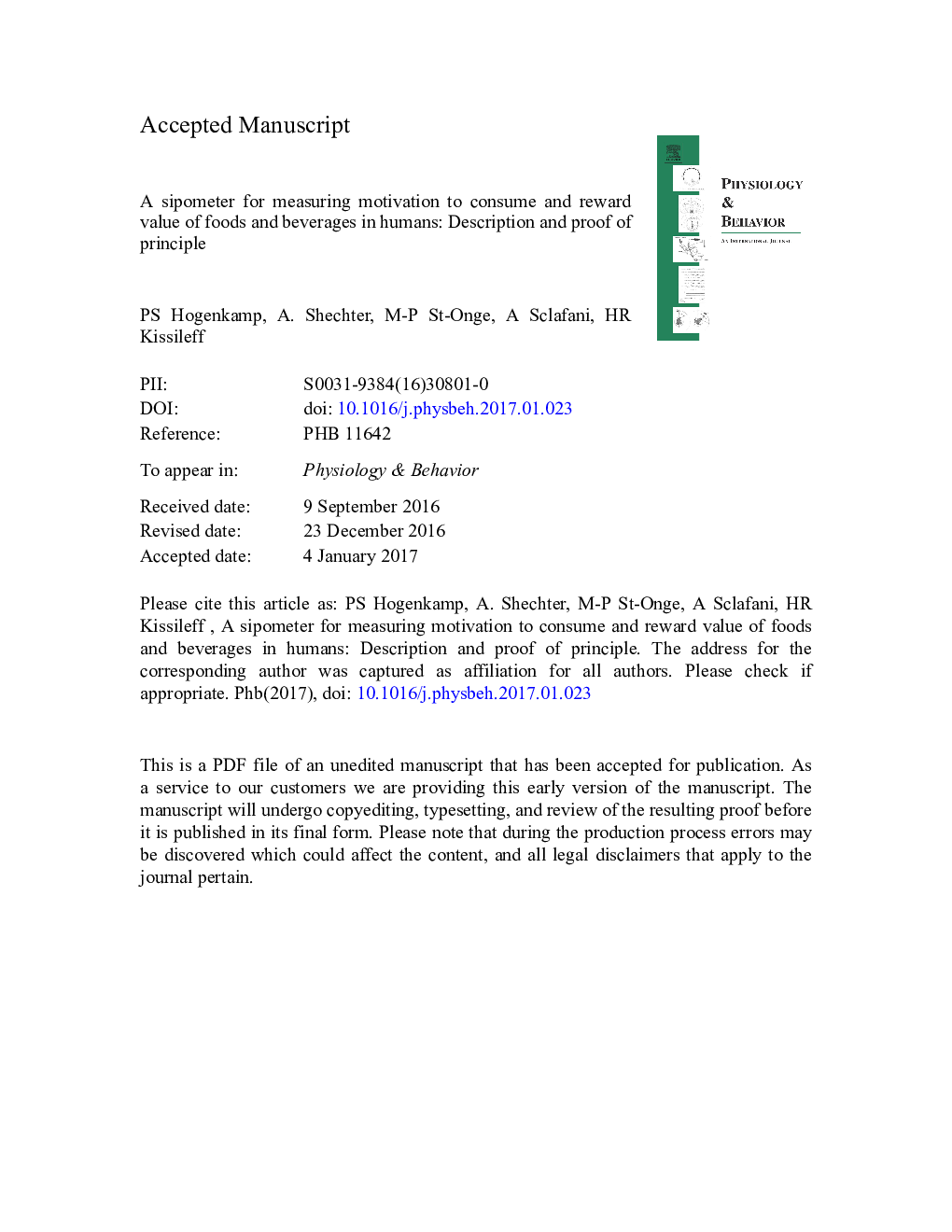| کد مقاله | کد نشریه | سال انتشار | مقاله انگلیسی | نسخه تمام متن |
|---|---|---|---|---|
| 5593843 | 1571148 | 2017 | 55 صفحه PDF | دانلود رایگان |
عنوان انگلیسی مقاله ISI
A sipometer for measuring motivation to consume and reward value of foods and beverages in humans: Description and proof of principle
ترجمه فارسی عنوان
یک سیفومتر برای اندازه گیری انگیزه برای مصرف و پاداش ارزش غذاها و نوشیدنی ها در انسان: شرح و اثبات اصل
دانلود مقاله + سفارش ترجمه
دانلود مقاله ISI انگلیسی
رایگان برای ایرانیان
کلمات کلیدی
جایزه، تقویت ارزش، انگیزه، رفتار محتاطانه، دوست داشتنی بودن
موضوعات مرتبط
علوم زیستی و بیوفناوری
بیوشیمی، ژنتیک و زیست شناسی مولکولی
فیزیولوژی
چکیده انگلیسی
New methods, derived from animal work, for measuring food reward value (i.e. reinforcing value of food), and motivation (i.e. strength of desire) to consume, in humans are described and validated. A sipping device (sipometer) was developed that permits access to a liquid food or beverage on two reward schedules: continuous reinforcement (CR) and progressively increasing time spent exerting pressure on a straw (PR-schedule). In addition, a pictorial scale showing a cup, from which the 'amount wanted' could be marked was used to pre-test potential consumption. Intake, time spent sipping, breakpoint, and pressure exerted were the main dependent variables measured. Three pilot experiments were conducted. In Experiment 1, participants (n = 8) consumed yogurt shakes after a 1-h or 21-h food deprivation period on both schedules. In Experiment 2, participants (n = 8) sham-consumed (i.e. spit out) sweet and non-sweet beverages, utilizing both schedules. In Experiment 3, sham-consuming sweet and non-sweet beverages on both schedules and working for shake on the PR schedule were repeated, after three nights of either habitual sleep or short sleep duration (n = 7) in a crossover design. In Experiment 1, participants sipped longer after 21-h vs. 1-h of food deprivation (13 ± 3.0 vs. 8.0 ± 2.1 s; p = 0.04), on the PR schedule. In Experiment 2, sham-intake (p = 0.01) and sipping time (p = 0.04) were greater for sweet than non-sweet beverages on the PR schedule and a similar, though not conventionally significant, effect was observed for exerted pressure (p = 0.09). In both Experiment 2 and Experiment 3 after habitual sleep, on the PR schedule, cumulative pressure difference between sweet and non-sweet beverage increased with difference in amount wanted in the taste test. In contrast, after short sleep participants were less willing to work for sweet taste as their wanting increased, suggesting that sleep deprivation raises desire, but lowers behavioral output. Taken together these results demonstrate that the sipometer and associated ratings are reliable and useful measures of motivation to consume and reward value in humans. Participants were more motivated to obtain access to sweet beverages, especially when these were better liked than to obtain access to non-sweet beverages.
ناشر
Database: Elsevier - ScienceDirect (ساینس دایرکت)
Journal: Physiology & Behavior - Volume 171, 15 March 2017, Pages 216-227
Journal: Physiology & Behavior - Volume 171, 15 March 2017, Pages 216-227
نویسندگان
PS Hogenkamp, A. Shechter, M-P St-Onge, A Sclafani, HR Kissileff,
